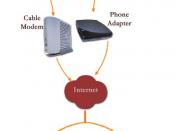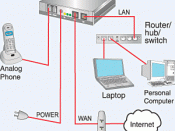Introduction Global communications has become a must for all sectors of business and life for our world today. With the spreading use of the Internet, people across the globe are able to communicate. VoIP will increase the use of the internet that was once only the domain of data by allowing voice to be transmitted. The voice signal would be digitized, compressed and converted into IP packets for its transmission on the IP network. One of the main motivations for businesses to use VoIP is the very low costs to make long distance calls. However, there are some other motivations that can mention for the allure of VoIP for businesses. One of them is demand for integrating of data and voice networks and the demand for multimedia communication.
Making The Case For Switching To VoIP The future success of VoIP will be strongly influenced by customer opinions of call quality and how this quality compares with that of the public switched telephone network (PSTN).
The unreliable nature of the Internet and initial product offerings, where cost savings were often gained at the expense of quality, has led to an image that VoIP is of a worse quality than circuit-switched networks. The ?poor quality? image has, to some extent, accompanied VoIP as it has moved from the domain of the Internet enthusiast to being used in today?s carrier-scale networks.
Carriers are eager to squeeze maximum efficiency from their networks but understand that there is a minimum quality level required to achieve customer acceptance. Enterprise customers, now adopting VoIP, are also sensitive to noise, distortions and general impairments in their voice communication systems.
One of the most commonly discussed concerns is that VoIP will never deliver ?appropriate quality?. However, to achieve a high-quality VoIP solution is not impossible, rather an engineering...


